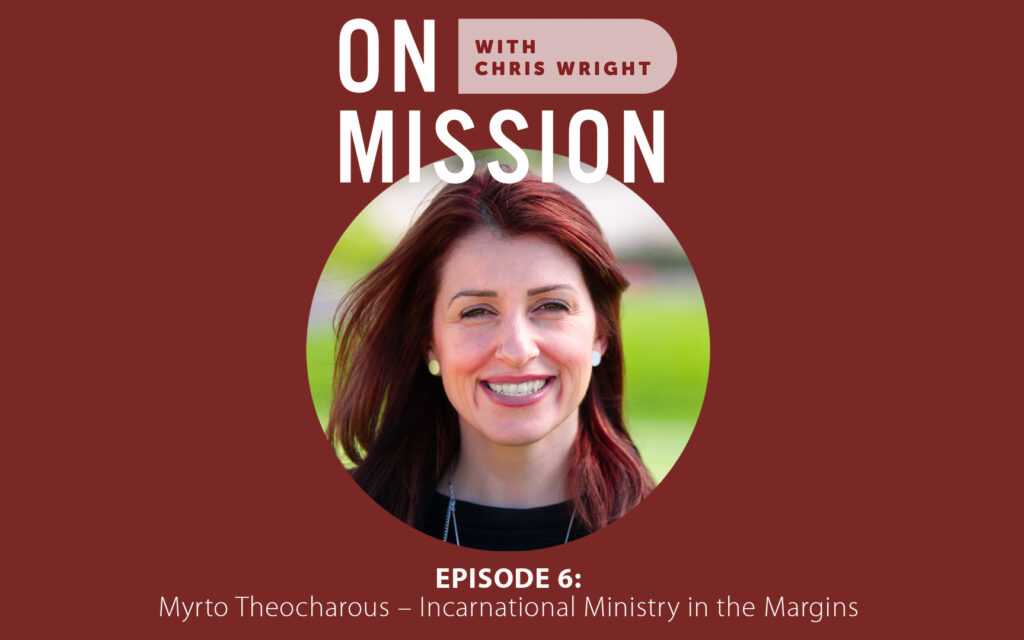Four Truths We Learned from a Greek Bible Scholar

Langham Scholar Myrto Theocharous spoke with Langham’s Global Ambassador and Ministry Director Chris Wright on Langham’s “On Mission” podcast. Click to listen and learn from the internationally recognized Bible Scholar.
Dr. Myrto Theocharous, from Athens, Greece, is something of a trailblazer. With scholarship support from Langham, she became the first evangelical woman to get a PhD in Bible and Theology in her country. Today, she is an Old Testament scholar, and her work writing and teaching at Greek Bible College equips future pastors who will help strengthen the tiny evangelical church in her nation. She’s passionate to see theology move beyond the seminary walls and impact the lives of the poor and oppressed.
In her conversation on On Mission with Chris Wright , she talks about how studying the book of Deuteronomy inspired her work as an advocate for victims of sex trafficking, and she shares some powerful insights on what Christians in the West can learn from their brothers and sisters in Greece.
Here are 4 Truths We Learned from Myrto
1. In this land where Paul contended for the gospel—many today are unaware of Greece’s rich biblical history.
And it shapes how the church needs to approach missions. Myrto says, “Outside of ecclesiastic, theological circles, this is very unknown. Not much attention is paid by the people to this heritage. We have to revive it for the people to show what started here and make them see the connections. . . We need to show the people that the faith that they have inherited has truths in it, has something to be recovered. It’s vibrant, it’s relevant for them, for their lives today. . . So we’re basically fighting against secularism. Atheism and secularism is the big enemy of the people’s faith.”

2. More than 90 percent profess to be Christians, with Greek Orthodox as the dominant faith. Evangelicals make up a tiny 0.4 percent.
“This is a reason that the Evangelical church is very tiny, because the country is supposedly Christian, or they declare that they are Christian so they don’t need to hear about Christianity from anywhere else. Or they don’t feel that they are lacking anything in their faith. But we observe that this has become a cultural identifier rather than a really vibrant kind of faith. There are people, of course, in the Orthodox church that are very conscious of their faith. . .They’re practicing consciously what they believe, and there’s others who just go through the moves.” Within academic, theological circles—Orthodox and Evangelical Christians share the same goal. Myrto says, “Today, mission among the Greeks looks like helping them recover the lost heritage. This is the same mission for people in the Orthodox world who are conscious of their faith and they love the Scriptures; they see the richness and the treasure in their heritage. And so in that we can unite in a common goal and a common purpose.”
3. If the church wants to imitate God, it must become a church that seeks liberation for the oppressed.
Myrto’s Old Testament studies, especially the book of Deuteronomy, inspired her to take theology into the streets—to the vulnerable, the lost, the enslaved. Myrto says, “The purpose of the Old Testament, and especially Deuteronomy, is to form the identity of the people. . . Deuteronomy keeps repeating this famous phrase, ‘For you were slaves in Egypt, therefore do this and that.’ So the mandate for action comes from the identity of being liberated, of having been liberated by a liberator God. For me, I couldn’t see any other way of being other than discovering, tracing, seeking the people who are not enjoying the same liberation that I am. You have to get up and leave your sphere and enter another sphere in order to find these people. That’s where we will meet people who are in need. We will meet Jesus, in fact, because that’s where Jesus is, in the most needy.”
4. A message the Greek church can teach the American church: Humility can be a powerful witness to a watching world.
Myrto says, “Every church has a lot to learn and room to grow, but one thing I see very much in Greece is the benefit of being a church without power, without political power. And this is a gift in my opinion for the church, the lack of power. It forces the church to serve under the radar. It forces the church to have humility, not to seek its own glory and its own purposes, not to exercise power over others who are perhaps of a different faith or a different denomination. . . I would encourage churches where this is not the case to practice more of a kenotic ecclesiology, an emptying of their power. . .Salvation was achieved by this appearance of Jesus being a loser, so this should be a mark of the church in my opinion. This humbling, this humility, is something that we need.”
Take the next step with Langham
Learn more about how Langham trains strategic leaders like Myrto around the world.
Read Myrto’s article, “Becoming a Refuge: Sex Trafficking and the People of God”.
Explore more conversations on our podcast, On Mission with Chris Wright.
